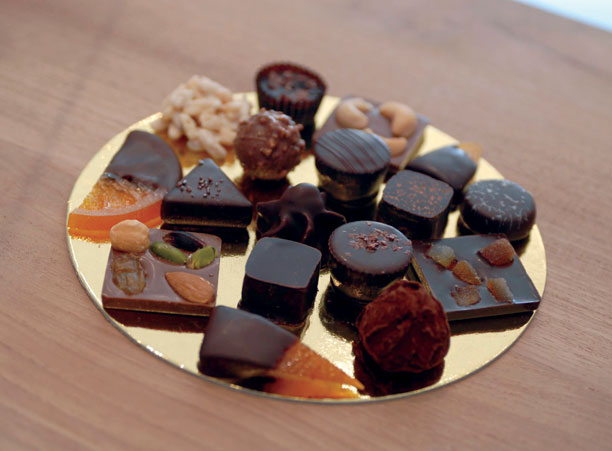
Mary Elise McGrail ’16 participated in associate professor of philosophy Andrea Borghini’s “Philosophy of Food” Maymester course in Tuscany twice, once as a student and a second time as a mentor. The summer study abroad program changed how she approaches a meal.
I had the best chocolate I’ve ever tasted on the 2014 Tuscany Maymester. I will never forget the level of concentration a group of 18- to 21-year-old Holy Cross students exhibited as chocolatier Paul De Bondt insisted we let a sliver of chocolate melt on our tongues, rather than chew it and ruin the complete tasting experience. Needless to say, Paul was right. The chocolate was so transformative, I had to return this past summer.
I don’t think anyone who knows me well was surprised when I chose to partake in a learning experience with “food” in the title. Indeed, Professor Borghini’s course distinguishes itself from all other Maymester experiences in this sense. Food encounters are the most daring aspect of the course. I became newly acquainted with food as a medium that can challenge and disturb my sense of self (read: a regretted bite of cow brain) or cause euphoria (see above for chocolate) and was transformed by how much food matters in the presentation of a culture, community or family’s self-understanding.
There is no university in the small town of Panzano in Chianti, Tuscany, Italy. Students gather in an open community space for class, but much of the learning experience happens hands-on under the tutorial of experts in kitchens, farms, orchards, vineyards and beyond. The Tuscan landscape is the university, breathing life into the trope that studying abroad allows students to live the challenges encountered in the classroom.
Likewise, the new knowledge and consciousness taught in the class infuses a high degree of responsibility into the independent choices made regarding food. You are encouraged to ask your questions about ethics and sustainability from the texts, but also expected to understand the honest answer when looking a Chianina calf in its curious brown eyes or standing next to a 2,000-year-old olive tree a family has tended through drought and epidemics for generations.
The course impressed upon me the importance of valuing our food at mealtimes. In doing so, food serves as not only nourishment, but as the basis for conversation, creativity and connectivity to others. Setting aside time for meals is not easy in our current culture, but the effort can be deeply rewarding, especially if a part is spent in gratitude. Students visit places such as farms to understand what it means for an animal to give its life and vineyards to see the investment of time, faith and money producers make in a small and vulnerable fruit. Bearing witness to these sacrifices culminates in a formed conscience about what we’re eating and what it means to eat it.
The “Philosophy of Food” Maymester continues to provide direction for how I want to live. The course does not seek to preach to you, but rather help you evolve in your awareness and attitudes towards the prevailing food culture, which includes a mindfulness of waste.
Since I’ve returned, I’ve found it worthwhile to approach meals with a series of questions — the first being, “Where did this come from?” — rather than solely accepting food as a means for satisfaction. In doing so, the choices I make about food can bring about change for the better. As the leaders of the Maymester, Professor Borghini and, of course, chocolatier Paul De Bondt, taught their students that patience is key in synchronizing to the needs of your environment. I was privileged to experience a change of landscape — and palate — to understand this.
Written by Mary Elise McGrail ’16 and originally published in the Fall 2016 food-themed issue of the Holy Cross Magazine.
Read more about the philosophy of food from Andrea Borghini, associate professor of philosophy, in the Holy Cross Magazine.
Related Information:
Recent Alumna Talks Food and Philosophy In Reflection on Maymester in Tuscany
Read Time
3 Minutes